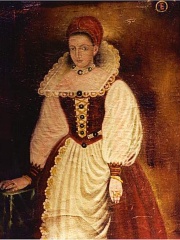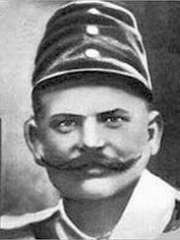

The Most Famous
EXTREMISTS from Hungary
This page contains a list of the greatest Hungarian Extremists. The pantheon dataset contains 283 Extremists, 2 of which were born in Hungary. This makes Hungary the birth place of the 22nd most number of Extremists behind Canada, and Iran.
Top 2
The following people are considered by Pantheon to be the most legendary Hungarian Extremists of all time. This list of famous Hungarian Extremists is sorted by HPI (Historical Popularity Index), a metric that aggregates information on a biography's online popularity.

1. Elizabeth Báthory (1560 - 1614)
With an HPI of 80.77, Elizabeth Báthory is the most famous Hungarian Extremist. Her biography has been translated into 59 different languages on wikipedia.
Countess Elizabeth Báthory of Ecsed (Hungarian: Báthori Erzsébet, pronounced [ˈbaːtori ˈɛrʒeːbɛt]; Slovak: Alžbeta Bátoriová, 7 August 1560 – 21 August 1614) was a Hungarian noblewoman and serial killer from the powerful House of Báthory, who owned land in the Kingdom of Hungary (now Slovakia). Báthory and four of her servants were accused of torturing and killing hundreds of girls and women from 1590 to 1610. Bathory and her cohorts were charged for 80 counts of murder and were convicted. Her servants were put on trial and convicted. The servants were executed, whereas Báthory was imprisoned within the Castle of Csejte (Čachtice) until she died in her sleep in 1614. The charges levelled against Báthory have been described by several historians as a witch-hunt. Other writers, such as Michael Farin in 1989, have said that the accusations against Báthory were supported by testimony from more than 300 individuals, some of whom described physical evidence and the presence of mutilated dead, dying and imprisoned girls found at the time of her arrest. Recent scholarship suggests that the accusations were a spectacle to destroy her family's influence in the region, which was considered a threat to the political interests of her neighbours, including the Habsburg empire. Stories about Báthory quickly became part of national folklore. Legends describing her vampiric tendencies, such as the tale that she bathed in the blood of virgins to retain her youth, were based on rumours and only recorded as supposedly factual over a century after her death. Although these stories were repeated by at least three historians in the eighteenth and nineteenth centuries, they are considered unreliable by modern historians. Some insist that Elizabeth's story inspired Bram Stoker's novel Dracula (1897), although Stoker's notes on the novel provided no direct evidence to support this hypothesis. Nicknames and literary epithets attributed to her include Blood Countess and Countess Dracula. There are important flaws regarding modern scholarships attempt to paint Elizabeth Bathory as a victim of a "witch hunt". Firstly, Elizabeth was charged predominantly with murder and torture, not witchcraft. Secondly, on the night of the raid, Elizabeth Bathory was taken into custody along with her four accomplices. Elizabeth had accused two reverends and one pastor for the reason of her arrest, after a long conversation where Bathory attempted to blame her accomplices for the dead bodies being found. She added this statement after Pastor Barosius had asked her why she did not stop her accomplices from committing the tortures and murders. She said, "I did it ... Because even I myself was afraid of them". This statement was confessed by Bathory herself and was not done under torture. Critically, there were a handful of individuals who provided first-hand accounts of Bathory's crimes at the trial. Three of these individuals included Jakab Szivassy, Gergely Paztory, and Benedek Deseo. Deseo was the head of "The Lord's staff" at Castle Cjesthe and was responsible for operations at the castle. Since Deseo and Szivassy were around Bathory the most, they gave the most detailed confessions of what they witnessed at their time of service at Castle Cjesthe. It is important to note that these three men were not tortured into confessions, unlike Bathory's accomplices (Llona, Janos, Dorrthea, etc.). After Deseo was sworn in, he testified that Bathory "took a shoemaker's daughter named 'Illonka', stripped her naked and, in this way began to cruelly torment her by taking a knife, and beginning with the fingers, shoved the knife into both arms up the arms, then flogging her over again, then took a burning candle to her and burned her skin, and continued to torment her until she put an end to her life". He also testified that Bathory would "stick a sewing needle in her victims arms and use it to cut her way up the arm of a girl who could not 'sew'." Gergely Paztory was a court judge at Castle Sarvar for Elizabeth Bathory and was forty years old when he was sworn in and testified. He testified that a "young woman from Bratislava named Modl accompanied Bathory and Paztory on a trip to Fuzer". He continued, "The Lady Bathory forced her to dress up and act like a young girl, Modl pleaded for forgiveness as she could not act like a young girl since she is already married and has a child". Following this, in Jakab Szivassy's testimony, Jakab added that the "young woman called Modl, since she did not want to be a girl, Bathory had cut out her flesh and roasted it". These testimonies were collected by Mozes Cziraky and was published on December 14, 1611, in his report on the orders of King Matthias II.

2. Béla Kiss (1877 - 1915)
With an HPI of 59.59, Béla Kiss is the 2nd most famous Hungarian Extremist. His biography has been translated into 17 different languages.
Béla Kiss (; Hungarian: [ˈbeːlɒ ˈkiʃ]; c. 1877 – after 4 October 1916) was a Hungarian serial killer. He is thought to have murdered at least 23 young women and one man, and attempted to pickle their bodies in large metal drums that he kept on his property.
People
Pantheon has 2 people classified as Hungarian extremists born between 1560 and 1877. Of these 2, none of them are still alive today. The most famous deceased Hungarian extremists include Elizabeth Báthory, and Béla Kiss.

